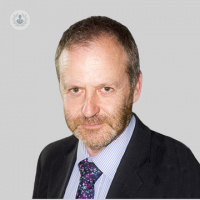Epididymal cysts: When is surgery needed to remove growths in the scrotum?
Written by:An epididymal cyst is a fluid-filled growth that forms in the epididymis, the tube located on the upper testicle (in the scrotum). Although non-cancerous and generally painless, surgery for the removal of an epididymal cyst may be recommended.
Here, Mr Mark Cynk, highly experienced consultant urological surgeon, provides an expert insight into epididymal cyst surgery, explaining when surgery is indicated, what happens during the procedure and how painful it is, among other important points.

What causes scrotal cysts to form? How common are they?
We do not really know why cysts form in the scrotum or (most commonly) in the epididymis. Although scrotal cysts are very common, they are a condition that is treated by urologists.
When is surgery to remove an epididymal cyst necessary?
We are always happy to leave small epididymal cysts alone. Often, the main issue is that patients will notice a lump and their concern is that it is something serious, such as testicular cancer. So, the first part of the investigation is to exclude the more serious abnormalities.
If we have excluded testicular cancer and the small cysts are not causing many symptoms, then we tend to leave them. Large cysts, on the other hand, tend to interfere with daily life, causing pain.
A rule of thumb is that once a cyst is about the same size as the testicle itself, (most of the time) surgery becomes indicated.
What happens during the procedure?
Epididymal cyst surgery is usually performed under a general anaesthetic and as a day-case procedure. During surgery, we make a small incision, deliver the testicle and the epididymis, and shell out the epididymal cyst. At the end of the operation, there is a short line of sutures, which are generally dissolvable.
The majority of patients prefer to keep the scrotum elevated during the early stages for comfort. For this reason, pain relief medications are provided when patients go home.
Is it painful?
Some pain is to be expected from any operation and we are clearly working on a sensitive area here. Despite this, most patients are able to return to their normal activities after a period of one to two weeks of recovery. Most patients are also off pain relief medication within a week.
How likely are epididymal cysts to recut?
Although epididymal cysts can recur, the recurrence rate is relatively low. Thus, it is unusual for patients to require more than one operation.
However, some patients will develop cysts on the opposite side of the epididymis at a later date, which may require treatment.
If you require expert treatment for an epididymal cyst, don't hesitate to visit Mr Cynk’s Top Doctors profile today.


